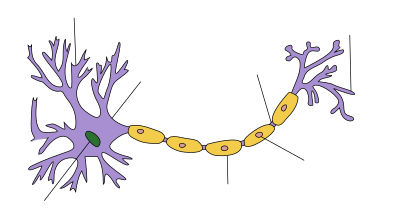
Screwing up makes one better.
Bjork: "The more we generate impulses, encountering and overcoming difficulties, the more scaffolding we build. The more scaffolding we build, the faster we learn."
Charles Darwin: "I have always maintained that excepting fools, men did not differ much in intellect, only in zeal and hard work."
Brain Insight #1: All actions are really the result of electrical impulses sent along chains of nerve fibers.
Brain Insight #2: The more we develop a skill circuit, the less we're aware that we're using it.
Myelin (a dielectric electrically insulating) material is critical to this process. The main purpose of a myelin layer (or sheath) is to increase the speed at which impulses propagate along the myelinated fiber. It is represented by the yellow part in both pictures.

Myelin operates by a few principles:
- The firing of the circuit is paramount.
- Myelin is universal--one size fits all skills. It doesn't care who you are, only what you do.
- Myelin wraps--it doesn't unwrap. Therefore, the only way to break a habit is to myelinate new circuits.
- Age matters. Genes do not change as one grows older, but the ability to build myelin does.
"Excellence is a habit." Aristotle
The Bronte sisters became great writers not in spite of the fact that they started out as immature and imitative but because they were willing to spend vast amounts of time being and energy being immature and imitative, building myelin.
Rule 1: Chunk It Up
"Just take one step at a time."
Absorb the whole thing: Spend time seeing the desired skill as a single coherent skill. Anders Ericsson says, "We are prewired to imitate."
Break it into chunks: Break a goal into its component pieces and progress through each piece.
Slow down: Football coach Tom Martinez says, "It's not how fast you can do it. It's how slow you can do it correctly."
Rule 2: Repeat It
Spending more time is effective, but only if you are at the edge of your capabilities, attentively building and honing circuits.
Rule 3: Learn to Feel It
"divine dissatisfaction": Martha Graham
"Every great and commanding moment in the annals of the world is a triumph of some enthusiasm." Ralph Waldo Emerson
How a learner sees himself will have a staggering difference on what is accomplished. A study was done with a group of children asking how long they expected to play an instrument. Those who intended to play all their lives saw themselves as musicians. With the same amount of practice, the long-term commitment group outperformed the short-term commitment group by 400 percent. The long-term-commitment group with a mere twenty minutes of weekly practice, progressed faster than the short-termers who practice for an hour and a half. When long-term commitment combined with high levels of practice, skills skyrocketed. In other words what a learner brings to the first lesson is more important than anything the teacher can do, or any amount of practice.
Motivation is not as simple as saying I want X. It's saying I want X, so I better do Y like crazy now.
The unconscious mind is able to process 11 million pieces of information per second, while the conscious mind can manage a mere 40. This disproportion pints to the efficacy and necessity of relegating mental activities to the unconscious.
True to the findings of Carol Dweck's work, the value of effort and slow progress rather than innate talent or intelligence is what matters. Therefore, it is affirming the struggle that ignites learners.
There are lessons to learn from KIPP.
Talent Whisperers:
- Quiet, even reserved
- Listen more than talk
- Their eyes are sharp and warm and are deployed in long, unblinking gazes in order to figure out the learner
- Rather than giving pep talks or inspiring speeches, they spend most of their time offering small, targeted, highly specific adjustments
- Extraordinary sensitivity to the person they are teaching, customizing each message to each student
- Continually push the learner to the next level
Skill is insulation that wraps neural circuits and grows according to certain signals.
IGNITION  DEEP
PRACTICE
DEEP
PRACTICE  TALENT
TALENT